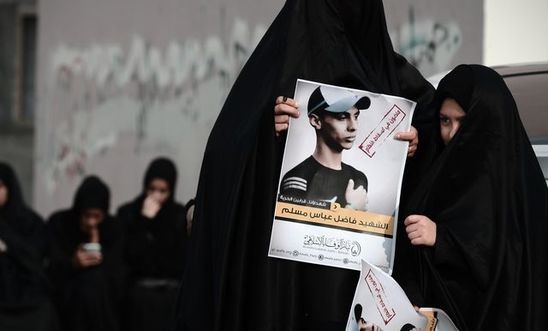
Press releases
Bahrain: warning of crackdown during Grand Prix this weekend

Past Grand Prix human rights abuses still not addressed
As the eyes of the sporting world turn to Bahrain’s Formula One Grand Prix this weekend, Amnesty International is urging the Bahraini authorities to allow peaceful protests that may take place around the event.
Opposition activists calling for a boycott of the Grand Prix have already been branded “traitors” by the government and there are fears that the authorities may use recent unrest - including attacks on police - to justify imposing further restrictions during the Grand Prix, such as preventing people from leaving their villages and clamping down on peaceful protests.
During previous Bahrain Grand Prix events, the authorities have cracked down on pro-reform demonstrators, and foreign and local journalists have been barred from covering protests, with some deported from Bahrain for attempting to do so without permission.
Compounding ongoing abuses, there has been a complete absence of accountability for past violations, with a host of victims and their families still awaiting justice for killing and torture that occurred during previous Grand Prix events.
Amnesty International Middle East and North Africa Deputy Director Said Boumedouha said:
“Bahrain’s authorities must not repeat past mistakes by restricting freedom of movement or crushing protests.“Three years on from the 2011 uprising, Bahrain has seen only cosmetic changes and empty promises of reform. Arbitrary arrests, crackdowns on protests and torture in custody continue unabated.“Rather than continuing to resort to security measures to deal with anti-government protests, Bahrain’s authorities should mark the Grand Prix by announcing concrete steps to address the dire state of human rights in the country.”
Grand Prix injustice
Two years after Salah ‘Abbas Habib’s death during the 2012 Bahrain Grand Prix, his family is still awaiting justice. The 37-year-old was shot dead by security forces on 20 April 2012 following protests in Manama. His family was prevented from seeing his body for three days. Last November a policeman was acquitted of involvement in his killing because of lack of evidence and contradictory testimonies from witnesses. No one else has been prosecuted in relation to his death.
During last year’s Bahrain Grand Prix, two women - Nafeesa al-‘Asfoor, 31, and Rayhana al-Mousawi, 38 - were arrested after they attempted to enter the Formula One circuit to protest against the imprisonment of political activists. Both have been charged with the intent to commit terrorist acts and possession of explosives and their trial is ongoing. Last September Rayhana was sentenced to five years in prison in a separate case for links to the “14 February Coalition”, a youth movement which was named a terrorist organisation by the authorities last month. The women claim they were tortured and ill-treated during interrogation and were forced to sign “confessions” which they later withdrew. Amnesty is calling for a thorough and independent investigation into the women’s allegations of torture and for those responsible to be brought to justice.
This year’s Grand Prix also marks three years since the arrest of Mahdi ‘Issa Mahdi Abu Dheeb, former president of the Bahrain Teachers’ Association. He spent 64 days in solitary confinement and was beaten and tortured in custody even after he had signed a forced “confession”. Amnesty considers him a prisoner of conscience arrested solely for the peaceful expression of his views and is calling for his immediate and unconditional release and for his torture allegations to be investigated.
A number of human rights activists, including Nabeel Rajab and Abdelhadi Al-Khawaja, and hundreds of other political prisoners are languishing in prison solely because they peacefully led or called for anti-government protests.